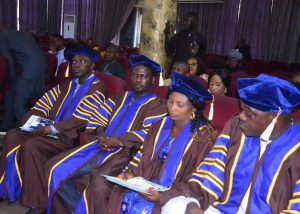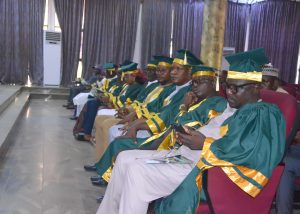A COMMUNIQUE AT THE 4th NATIONAL STAKEHOLDERS’ SEMINAR ON ENVIRONMENT AND SAFETY CHRISTENED ‘’BANDITRY AS A THREAT TO OCCUPATIONAL SAFETY IN NIGERIA’’, ORGANIZED BY ENVIRONMENT AND SAFETY MANAGEMENT INSTITUTE (ESMI) HELD AT RAW MATERIALS RESEARCH AND DEVELOPMENT COUNCIL, MAITAMA ABUJA, ON APRIL 30, 2024.
PREAMBLE: Stakeholders converged in Abuja to discuss “Banditry as a threat to occupational safety in Nigeria” at ESMI 4th National Stakeholders’ Seminar on Environment and Safety/13th induction and award ceremony; ESMI Chairman of Council, HRH Ibrahim Usman Jibril FESMI, in his welcome address reiterates; “As the saying goes, safety first is safety always hence, the implementation of comprehensive safety measures, provision of proper training and retraining of personnel and harmonious inter-agency collaboration is a panacea to address the root cause of banditry in Nigeria. As professionals in the field of occupational safety, we are duty bound to brainstorm regularly towards finding lasting solutions to these incidences which not only plague the lives of individuals in their vocations but disrupt the smooth functioning of governance thereby putting every sector of our economy in jeopardy. The overall aim of this Stakeholders’ Seminar is to raise awareness, advocate for change through collaborating with relevant authorities and other stakeholders, so that, together we can make a difference and create safer and more secure environment for all workforce in all work-of-life in Nigeria.
 PARTICIPANTS AT THE 4th NATIONAL STAKEHOLDERS’ SEMINAR ON ENVIRONMENT AND SAFETY
PARTICIPANTS AT THE 4th NATIONAL STAKEHOLDERS’ SEMINAR ON ENVIRONMENT AND SAFETY
Delegates at the event were drawn from federal Ministries, Departments and Agencies, state governments, office of Head of Civil Service of the Federation, Office of the Secretary to the Government of the Federation, international organizations, academia and the media.
GOODWILL MESSAGES: Special Guests of Honour at the event took turns to deliver their goodwill messages.
GUEST SPEAKER: Dr Daniel Dam Peverga of the Benue State University Makurdi.
PRESENTATIONS BY GUESTS ON BANDITRY AS A THREAT TO OCCUPATIONAL SAFETY IN NIGERIA
- The presenters identified the root causes of banditry in Nigeria to include under development, leadership failure and bad governance, unemployment, poverty, corruption, proliferation of arms, quest for dominance/cultural supremacy, high cost of education, criminality, climate change, politics of regime protection and territorial conquest.
- The presenters equally identified the immediate causes of banditry in Nigeria to include the influx of alien herdsmen, population explosion, breakdown of social values, quest to make quick money, farmer-herder conflict, weakening government institutions, mass illiteracy, free movement of persons and proliferation of small arms and weapons, hunger and human intolerance, drug use and abuse.
- The presentations acknowledge the Psychological effects of banditry among Nigeria Workers to include Fear, High blood pressure, mental challenges/trauma, hatred, low self-esteem, as well as physical effects in terms of loss of moral, spread of sexually transmitted diseases, loss of livelihoods including farming, loss of properties including working tools; death, Permanent injury/disability, kidnapping, rape/molestation, low productivity, hunger and starvation etc
FOCUSED DICUSSIONS: Lead by CSP Dr. Tersugh James Vandefan Rtd. (JP)
Participants at the seminar identified factors fueling banditry in Nigeria to include:
- Poverty and Hunger:
Most individual involved in banditry are within the age bracket of 15 to 45yrs. They are poor, hungry agile and mobile and have no visible means of livelihood. These group of persons are easily recruited to take part in illegitimate businesses such as banditry, thuggery and cattle rustling for peanuts just to survive.
- Illiteracy:
A survey of those involved in banditry has revealed, a large number of them to be illiterate often with education not beyond the first few years of primary school or secondary school dropout. These group of persons do not have reason to hope for a better tomorrow and they live from hand to mouth; and as such are ready to take unnecessary risks for a small amount.
- Porous Borders:
Our borders are very porous and under manned even when properly manned are under-equipped and/or bedeviled with corruption which aid and abate influx of small arms and weapons which finds its way into the hands of marauders.
- Ungoverned Spaces:
These provide safe haven for bandits/terrorist. We therefore declare unacceptable the significant loss of lives and livelihoods by vulnerable groups such as women, children and youth, and indigenous people, leading to imminent food security challenges and diversion of resources meant for development to carter for IDPs.
BANDITRY AS A THREAT TO OCCUPATIONAL SAFETY IN NIGERIA: THE WAY FORWARD
Accordingly, participants at the Environment and Safety Management Institute 4th National Stakeholders Seminar came up with the following solutions to tame the demon of banditry in Nigeria:
- Expansion of social safety nets to accommodate unemployed youths who must have verified addresses or some form of identification to prevent them from being lured in to the banditry business.
- USE OF NON-STATE ACTORS TO CURB BANDITRY:
Vigilante groups and local hunter’s associations are good in tracking kidnapped victims because of their knowledge of local environment. They may receive additional training from police and must have the blessing of traditional rulers
iii. CONVERTING UNGOVERNED SPACES TO FARMS OR PROJECT SITES
Bandits make safe haven of ungoverned spaces. Such spaces may be converted to farm settlements for unemployed youths which are to be protected by agro rangers in Civil Defence Corps.
- USE OF TECHNOLOGY
Our security agencies must be equipped with and learn how to use existing technologies to achieve scale. Such technologies include, mobile phones, remote sensors and satellite imagery services.
- YOUTH EDUCATION
Since most of the youth recruited into banditry are illiterate, we must introduce and step up vocational/non-vocational education in some identified states. A skill population is a great resource to any nation.
- EFFECTIVE POLICING OF OUR HIGH WAYS
High ways to be segmented and controlled by a group of security personnel composing of Nigeria Army, the Police, Nigeria Civil Defense Corps with local vigilante/hunters from that segment of the road. The group should be properly equipped with serviceable vehicles and communication gadgets links to villages within the segment. The group must be incentivized and held accountable.
vii. PROPER CONTROL OF OUR POROUS BORDER
This has become imperative, necessitating recruitment of additional hands into the Customs, Immigration and Civil Defense Corps; equipped with the latest gadgets. All seized small arms to be destroyed immediately leaving no room for recycling/stockpiling and subsequent theft.
viii. The department of Agro Rangers in the Civil Defense Corps should be expanded and more personnel recruited and equipped to enable them protect farmers nation wide.
- The Federal Government should queue into the Environment and Safety Volunteer (ESV) programme of the Environment and Safety Management Institute. By taking up the ESV programme, young people will be recruited as volunteers across the 774 Local Government Areas in the country to render environmental safety services after being trained by the institute. This will help serve dual purposes of solving environmental and safety challenges in the country as well as creating jobs for the youths during the period of volunteerism.
- The National Assembly should expedite action on the Chartered Institute of Environment and Safety Management Establishment bill (HB 667 and SB 1015) which is before the two chambers in order to give the institute the legal backing to carry out more interventions that will ensure safety in organizations and communities.
- NAMING/SHAMING
We must draw on the emotion of the parents of bandits. We have to name them and shame them publicly for the families to see in order prevent others from joining banditry.
13th INDUCTION AND AWARD CEREMONY
The 4th National Stakeholders’ Seminar on Environment and Safety, Abuja came to a climax with the induction of new members into the Environment and Safety Management institute (ESMI) as Associates, Full-Time Members, and Fellows of the Institute.
OUR COMMITMENTS: BANDITRY AS A THREAT TO OCCUPATIONAL SAFETY IN NIGERIA
- That adequate strategic measures must be taken to make Nigeria environment a safe place to work; all good health and safety starts with a risk assessment.
- We advocate that Workplace should be clean and orderly while being provided with adequate safety devices. Employers have a duty of care for employees to promote a healthy and safe working environment
- We admonish that all reasonable workers should always place priorities on safety before performing any functions or duties which could be termed as “safety first” hence, adequate enabling environment for security of live and property be provided at workplace.
- We reaffirm the efforts by the Nigerian government to protect and ensures the rule of law as contained in Article 17.3c of the 1999 Nigerian Constitution (as amended) which stipulates that “the government ensures and protects the health, safety, and welfare of all employees; The primary responsibility of any government is to ensure the security of lives and properties of her citizens which includes workers.
- We reinforce that Nigeria has several laws and policies on workplace safety including the 1994, ratified ILO Convention No.155 on occupational safety, health and working environment. On 8 November, 2022, Nigeria deposited to the ILO the instrument of ratification of the promotional framework for occupational safety and health convention, 2006 (No. 187) as well as the Violence and Harassment Convention, 2019 (No. 190).
CONCLUSION:
In conclusion, we envision a resilient Nigeria society via retooling compliance with occupational safety and health for sustainable vocational strategy aim at complementing national security apparatchik among vulnerable populations to balance development with economic prosperity while protecting and preserving lives and property. This journey will therefore involve subnational governments as well as parliament; hence the essential roles of the national parliament, states assembly and local council legislation through their enactment of livestock sector reform laws. Finally, legislative adoption of budgets and effective oversight roles in ensuring accountability for efficient implementation of ban-on-open grazing while developing a multi- stakeholder platform will suffice for a holistic human-security-based approach to banditry as a threat to occupational safety in Nigeria.
Communique Drafting Committee
Mr Ofem Akpan-Ibiang – Nasarawa State University Keffi (Chairmen)
Engr Edibo Sunday – Representative from Institute Board (Member)
Mrs Martha Chukwurah – Salaries and Wages Commission (Member)
Dr Dan Peverga – Benue State University Makurdi (Member)
Mrs Elizabeth Oladimeji – International Organization of Migration (Secretary)

Recent Comments